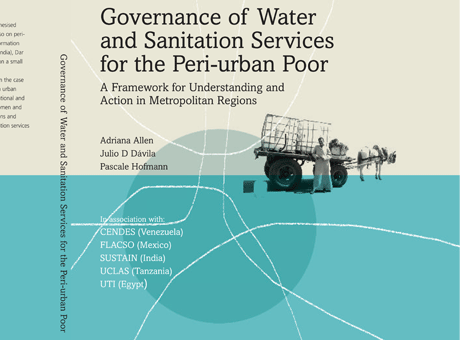Governance of Water and Sanitation Services for the Peri-urban Poor

5 November 2011
A Framework for Understanding and Action in Metropolitan Regions. This document is aimed at a broad range of development and environmental professionals, civic society groups, staff in training institutions and aid agencies, politicians and other decision-makers at the local, metropolitan and national levels.
This diverse range of actors reflects the complexity and scale of the problems associated with the interactions between urban and rural areas and the diversity of the people and productive activities in what is here described as the 'peri-urban interface'.
Authors:
Adriana Allen
Juilo Davila
Pascale Hofmann
Publication Date: May 2006
ISBN: 1 87450-60 9.
This document offers a conceptual and practical tool for those involved directly or
indirectly in the long-term planning and daily management of basic service provision in the metropolitan regions of developing countries. Its long-term aim is to contribute to a more reliable, affordable and sustainable access to water and sanitation services for the diverse and often-growing poor peri-urban populations in metropolitan regions.
The focus of this document is not on the technical aspects of designing and building infrastructure. Rather, it seeks to provide guidance to better comprehend the institutional and governance challenges of improving access to these basic services for poor peri-urban households and small-scale enterprises.
Without denying the crucial role played by municipal engineers and other technical water and sanitation staff, improved and reliable access to peri-urban water and sanitation services will not result from their isolated - and sometimes heroic - actions. Similarly, experience shows that access by poor residents and producers is unlikely to expand if left in the hands of private suppliers alone. Implementation of policies and plans that respond more effectively to peri-urban realities requires a better understanding of issues such as the inadequate peri-urban coverage of these services and the high presence of diverse formal and informal suppliers of basic services found in many cities. This challenge is all the more urgent in the context of the rapid pace that is a feature of peri-urban change, of the obvious fragmentation of government responsibilities for planning and supplying basic services to peri-urban areas and of the crucial environmental functions played by these areas.
 Close
Close

